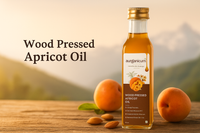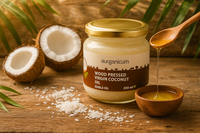Introduction: What is Khapli Atta?
Khapli Atta, also known as Emmer wheat flour, is made from one of the oldest varieties of wheat: Triticum dicoccum. This ancient grain is rich in nutrients like fiber, protein, magnesium, and antioxidants. Its earthy flavor and light brown color make it a popular choice for making rotis, breads, halwa, and baked goods.

Understanding Gluten
Gluten is a natural protein found in grains such as wheat, barley, and rye. It gives dough its elasticity and helps it rise. While most people can digest gluten without issue, those with medical conditions like celiac disease or gluten sensitivity may experience adverse reactions.
Does Khapli Atta Have Gluten?
Yes, Khapli Atta contains gluten, though in smaller amounts compared to modern wheat. Its gluten structure is less dense and easier to digest, making it a gentler option for some individuals. However, it is not safe for those with celiac disease or a confirmed gluten allergy.
How Khapli Atta Compares to Regular Wheat
-
Lower Gluten Content: Easier to digest, but not gluten-free
-
Higher Nutritional Value: Rich in fiber, iron, magnesium, and antioxidants
-
Lower Glycemic Index: Helps manage blood sugar levels
-
Minimal Hybridization: Retains the integrity of ancient grain structure
Who Should Eat Khapli Atta?
-
Recommended for: Individuals with mild gluten sensitivity or those seeking a healthier wheat alternative
-
Not recommended for: People with celiac disease, wheat allergies, or severe gluten intolerance
Common Culinary Uses
Khapli Atta is versatile and works well in both traditional and modern recipes:
-
Soft rotis and parathas
-
Fluffy pooris
-
Traditional halwa
-
Cookies, muffins, and rustic breads
Conclusion
Khapli Atta is not gluten-free, but it offers a more natural and nutritious alternative to modern wheat flour. It's ideal for those looking to reduce their gluten intake and improve digestive health. However, individuals with celiac disease or severe gluten intolerance should avoid it. As always, consult a healthcare provider for personalized dietary advice.













